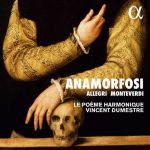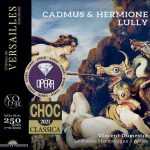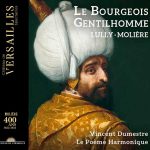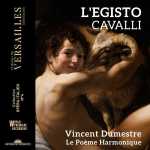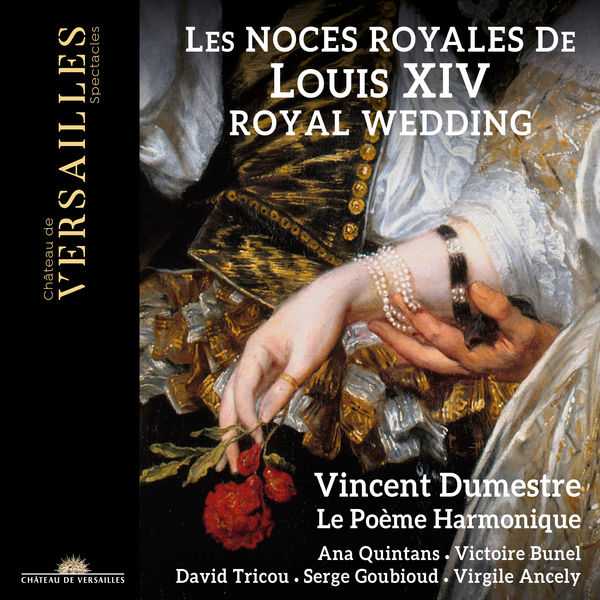
Composer: Pietro Francesco Cavalli, Louis Couperin, Juan Hidalgo, Jean-Baptiste Lully, Nicolas Metru, Guillaume Gabriel Nivers, Andre de Rosiers, Salamone Rossi, Jean Veillot
Performer: Le Poème Harmonique
Conductor: Vincent Dumestre
Format: FLAC (tracks)
Label: Château de Versailles Spectacles
Catalogue: CVS066
Release: 2022
Size: 1.12 GB
Recovery: +3%
Scan: yes
01. Lully: Sonneries pour les trompettes du Roi
02. Couperin: Prélude
03. Lully: Entrée pour la Maison de France
04. Lully: Les Espagnols
05. Lully: Les Basques
06. Veillot: O filii e filiae
07. Lully: Jubilate Deo
08. Lully: Qui posuit fines nostra
09. Lully: Lux orta est
10. Lully: Taliter non fecit
11. Lully: Jubilate
12. NiversPlein jeu du troisième ton
13. Nivers: Récit de cromorne du troisième ton
14. Rossi: Sinfonia grave
15. Cavalli: Magnificat anima mea
16. Cavalli: Et exultavit
17. Cavalli: Quia respexit
18. Cavalli: Omnes generationes
19. Cavalli: Quia fecit
20. Cavalli: Et misericordia
21. Cavalli: Fecit potentiam
22. Cavalli: Deposuit potentes
23. Cavalli: Esurientes
24. Cavalli: Suscepit Israël
25. Cavalli: Gloria Patri
26. Cavalli: Lasciatemi morire
27. Rosiers: Après une si longue guerre
28. Metru: O France
29. Hidalgo: Dos zagalas venian
The wedding of France’s King Louis XIV and the Spanish Infanta, Maria Theresa of Austria, on 9 June 1660 was a celebration like no other. The final sealing of the peace between two Catholic monarchies that had been opposed for centuries, it saw the 21-year-old French monarch undertake a 13-month journey to cross and discover his kingdom – 3,200km, completed in 95 stages involving 15,000 people and 8,000 horses, culminating by wedding in pomp in Saint-Jean-de-Luz, in southwest France’s Basque country, near the Spanish border. Then when the newly married majesties made their entrance into Paris, the finest extracts from Cavalli’s opera Xerxes were performed in their honour at the Louvre, along with Lully’s accompanying ballets. And indeed music played a starring role throughout the festivities, with major artists (along with bands, and the king’s trumpets) also accompanying Louis on his journey. For instance there was the famous viol player, Nicolas Hotman, to whom Louis apparently listened attentively to for two hours one afternoon in Saint-Jean-de-Luz. Also Jean-Baptiste Lully.
In other words, this was a large scale, multi-genre, multi-instrument, no-expenses-spared musical undertaking of mind-bogglingly sumptuous splendour. Also, though, one for which many of the final details have been lost in the mists of time. So for instance, while we know that the ‘royal delegation’ went to the church ‘accompanied by trumpet fanfares’, we don’t know which ones.
Still, while it’s a shame that we don’t know more, Vincent Dumestre has come up with a musical feast as he’s set about creating his own sumptuous-sounding take on how it might have all sounded, taking us on a musical odyssey which begins at the church doors with Lully’s Sonneries pour les trompettes du Roi – a joyous union of regal trumpets, organ, woodwind and drums, played with elegant multi-timbred oomph by the musicians of Le Poème harmonique. Then we’re on to the entrance of the delegations, opening with a Prélude by Louis Couperin before moving into processional music by Lully for each house, the twinkle-toed number for the Spaniards being especially ear-pricking. Onwards and the marriage is to organ music by Guillaume-Gabriel Nivers (1632-1714). After which comes Lully’s “Motet for Peace”, Jubilate Deo, sung with crisp vibrancy and devotion – and indeed it’s a fine clutch of vocal soloists across the programme, in the shape of Ana Quintans, Victoire Bunel, David Tricou, Serge Goubioud, Virgile Ancely.
However, when there’s only so long a review can be, I’m going to pick out just two further noteworthy moments. First, the presence on the programme of Jean Veillot (1600-1662), sous-maître of the Chapelle Royale at the time, and known to have been one of the composers involved in the musical celebrations of the peace agreement. His rapturously-received Te Deum, performed in Paris 1660, has been lost, but Dumestre has instead given us one of his few surviving works: the exuberantly lilting motet, O filii e filiae, which comes via a stunner of a performance, mellifluous solo voices rising and falling smoothly from the joyous choral texture, the singers’ bell-like sonority and lilting swing gorgeously mirroring the accompanying chiming brass lines. Then, Dumestre has rounded off his programme with an extract from an opera that not only do we know was definitely created for these wedding celebrations, but which also stands as the first extant record of an opera sung entirely in the Spanish language: Juan Hidalgo’s (1614-1685) Celos aun del aire matan, which premiered in Madrid in December 1660; and while this may have been the Spanish court’s studied emulation of what the French court was doing with Italian opera, the castanets and offbeat rhythms of merry ‘Dos zagalas venian’ leave us in no doubt as to the nationality. It also makes for a fabulous climax, with its singingly half speaking and laughing solo voices, its lustily rhythmic chorus, and strumming theorbo accompaniment with dancing brass interjections.
I say it again, this is a musical feast. Hugely recommended.
